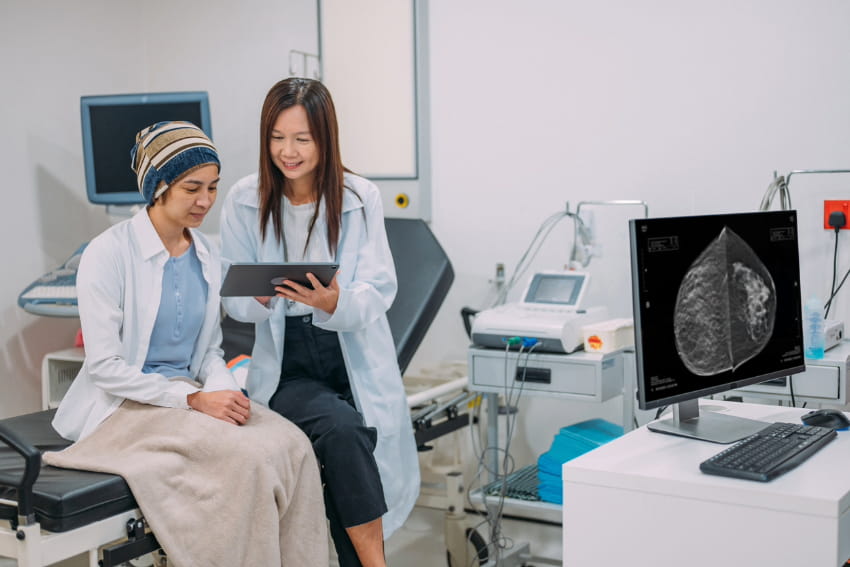Patient-focused care for breast cancer patients

Breast cancer affects each person in a unique way and is most successfully treated with care personalized to each patient.
"At Main Line Health, the focus has always been on putting patients first, ensuring that breast cancer patients are offered the most comprehensive care and support possible, from diagnosis to follow-up care," says Lina Sizer, DO, FACS, a breast surgeon at Main Line Health.
The breast cancer care team at Main Line Health provides patients with clear and understandable information about their diagnosis, treatment options and potential side effects, empowering them to make informed decisions about their care — before, during and after breast cancer treatment.
What is patient-focused care?
Patient-focused care is a holistic approach to care. It takes into consideration the individual and their health care needs. It means that care is collaborative and coordinated across many disciplines, and that care goes beyond physical well-being to also include emotional, social and financial aspects of a patient's situation.
How does patient-focused care empower patients?
Personalized treatment plans empower patients to take an active role in their own care and consider factors that are most important to them. When patients are involved in the decision-making process and fully informed about their treatment options, they're better equipped to make choices that align with their personal values, goals and situation.
This involvement not only helps patients feel more in control, but it also improves patient satisfaction, quality of life and overall outcome.
"Our health care providers listen to their patients' concerns, answer their questions and address any fears or anxieties they may have," says Dr. Sizer. "This open and respectful communication helps build trust and rapport, creating a supportive environment where patients feel comfortable sharing their thoughts and participating in their own care."
How does Main Line Health personalize the treatment plan for each breast cancer patient?
Breast cancer is a complex disease that affects each patient in a unique way. That's why we place a strong emphasis on personalized treatment plans that take into account a variety of factors that make each patient's journey unique.
By considering individual characteristics and involving patients in treatment planning, we make sure that every breast cancer patient receives the care that is tailored to their specific needs and situation, giving them the best chance of successful outcomes and a positive experience.
What about the importance of communication and coordination among the care team?
Breast cancer treatment often involves a multidisciplinary team of specialists, including surgeons, oncologists, radiation oncologists, genetic specialists and nurses. Each member of the health care team plays a vital role in the patient's care journey.
With clear lines of communication to effectively communicate information between team members, health care providers can work together seamlessly to provide comprehensive and coordinated care to their patients.
Your mammogram made easy
Did you know you don't need a prescription to schedule a screening mammogram?
What support services are available for breast cancer patients at Main Line Health?
A breast cancer diagnosis can bring about a wide range of emotions, and breast cancer support groups help patients address and manage these emotions. Support groups provide a safe and understanding environment where breast cancer patients can connect with others who are going through similar experiences.
"In addition to practical tips for living with cancer, these groups offer emotional support, validation and encouragement, allowing patients to share their thoughts, fears and successes with people who truly understand," she adds. "We offer survivorship programs that provide a structured and comprehensive approach to post-treatment care, focusing on the physical and emotional well-being of breast cancer survivors."
Next steps:
Meet Lina Sizer, DO, FACS
Learn more about breast cancer prevention and diagnosis
View current breast cancer clinical trials
 Content you want, delivered to your inbox
Content you want, delivered to your inbox
Want to get the latest health and wellness articles delivered right to your inbox?
Subscribe to the Well Ahead Newsletter.
